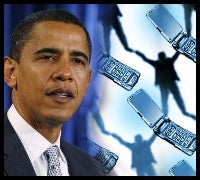 |
Voters went online in droves during the presidential campaign, posting videos, creating Facebook pages and support groups, seeding discussion boards and doing their digital part to make sure their man got elected president. For many netizens who supported President-elect Barack Obama, why should it end there?
According to a new poll by the Pew Research Center’s Internet & American Life Project, it won’t. A telephone survey of 2,254 adults found that many in Obama’s army of supporters are “ready to translate their campaign participation into direct engagement with the new administration.”
The Pew survey found that 62 percent of Obama voters it polled expect to encourage others to support the new administration’s policies during the upcoming year. Some 48 percent of responders expect to do so in person. About 25 percent said they expect to pump for the policies over the phone,
and 16 percent expect to promote the new president’s agenda to others on the Internet.
In addition, the survey found that, of the Obama voters who were active online during the campaign, one quarter of them plan to mobilize support for the administration’s policies online as well.
Aaron Smith, a research specialist with the project and author of the report, said supporters of Obama and his Republican rival, Sen. John McCain, grew accustomed to going online and expressing themselves during the campaign.
“Our findings show they liked that and found it to be empowering and don’t want that to go away just because Election Day has come and gone. They still want to be in the loop and want to be involved,” Smith told InternetNews.com. “What we see is that people got a sense of the power of that over the course of the campaign. It gave them a sense of the value of that engagement.”
Even greater expectations
The survey showed that Democratic supporters of Obama expect to stay connected: Some 34 percent of Obama-supporting e-mail users expect direct e-mail communication from the new administration; 37 percent of social network site users who support Obama expect to receive SMS updates and 11
percent of phone texters expect to receive text messages from the new administration.
As the inevitable bubble of security envelops the president-elect and his administration, the question remains: Are these expectations a little too unrealistic?
“That will be the question over the next six months or so as we look at what the administration is doing,” Smith said. He noted some examples so far of an attempt to stay connected to voters, such as asking for questions to the incoming secretary of health and human services, Sen. Tom Daschle, who responded in
a video posted to the president-elect’s Change.gov Web site.
The engagement continues for Republican causes as well, Smith noted, such as with a grassroots effort to energize the loyal opposition at RebuildtheParty.com. Smith said McCain voters also expect to hear from their own party in its opposition role. Some 33 percent of McCain voters expect to stay in touch with the Republican Party or GOP officials moving forward.
“The big story here is voters want that personal involvement and not just with the electoral and political but governing process,” Smith added. “There’s very much an expectation they want to be kept up to date, and have a stake in the game as the administration takes office. Whether those expectations will be met is very much an open question at this point and it all depends on what Obama does.”


